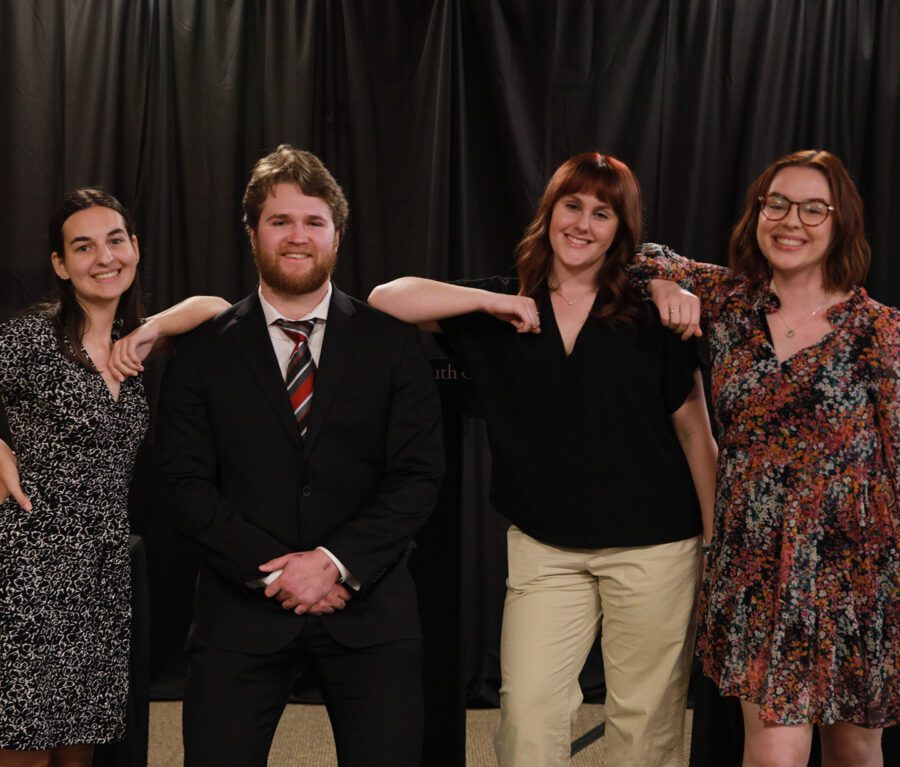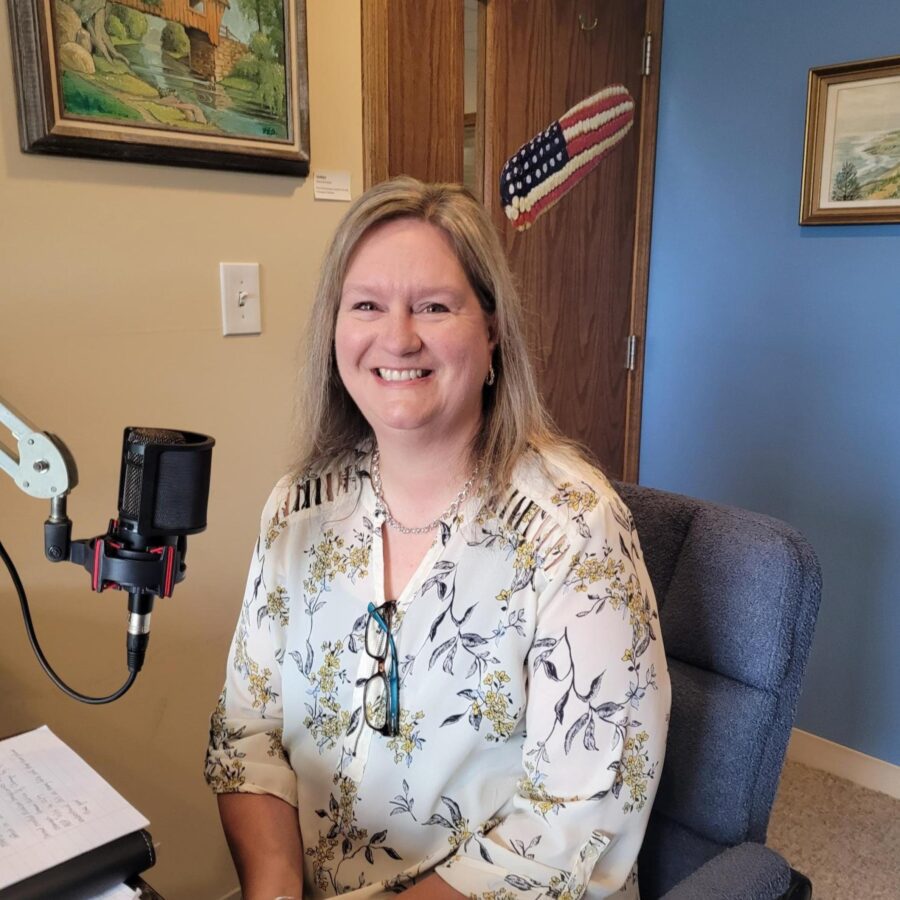Monmouth native and a senior at Monmouth College, Karli Strom was recently named Top Advocate of the college’s moot court competition for the second year in a row. Strom, who is double majoring in communication studies and political science, shares the amendment covered of this year’s moot court competition:
“This was a really interesting case. It was the 14th Amendment Citizenship Clause and was whether American Samoans are extended birthright citizenship under that citizenship clause. It was really balanced, but American Samoa is unincorporated territory of the United States and in a more recent case in 2015, two of the states, they did determine that American Samoans are indeed not citizens of the United States because they are unincorporated territory based off of previous case law and that is something that we either argued for or against within this. The first round I actually was arguing the actual question of the citizenship clause and if they are citizens or not and in the final round for myself, I was arguing whether or not the Supreme Court or Congress should decide that because right now Congress in the one who makes those decisions for those territories of Guam, Puerto Rice, and the rights that they have.”
Following graduation, Strom says she plans to apply to the Dunn Fellowship program in Chicago and the Illinois Legislative Staff Intern Program in Springfield, while also studying for the Law School Admission Test to apply to law school.
following story is courtesy of Barry McNamara, Monmouth College

Two of the three judges weren’t “real,” and the four student participants weren’t lawyers – at least not yet – but a court case was argued Oct. 29 in Monmouth College’s Hewes Library.
And after the petitioners and the respondents had made their statements and rebuttals, Karli Strom ’25 of Monmouth was named Top Advocate of the college’s moot court competition for the second year in a row.
The preliminary round of the college’s 14th moot court competition was held Oct. 26 in the Center for Science and Business as 13 students competed for the four finalist spots. Joining Strom in the final were Dean Duncan ’26 of Sparks, Nevada, Shannon Smith ’25 of Plano, Illinois, and Taylor Whitaker ’26 of Germantown Hills, Illinois. All four students are political science majors, with Strom adding a major in communication studies and Smith also studying psychology.
Even with all her preparation, Strom was thrown a curve ball, answering a different question in the final.
“I spent most of my weekend creating a new argument for the final round,” she said. “I also forced my brother to listen to my arguments, which he may not have found very interesting, but it helped me.”
Whitaker described her process for familiarizing herself with the case, which concerned the issue of whether individuals born in American Samoa are entitled to birthright citizenship under the citizenship clause of the 14th Amendment of the U.S. Constitution.
For one week, she said, “I shoved myself into a study cubicle in the library from the time my classes were over at 3, until about 6, took time to eat, and then I would come back to my dorm and work on it until 10 or 11 p.m. It takes a lot of time, preparation and effort if you want to do well. This is not something that you can just jump into the day before and expect to make it to the finals.”
Whitaker said she relied heavily on political science professor Mike Nelson and previous “mooters” to guide her through the process, giving Nelson “all the credit for how far along I got.”
Impressing the judges
Presiding over the final were Judge Nigel Graham of the 9th Judicial Circuit of Illinois, who served as chief justice, and Monmouth faculty members Vanessa Campagna and Mike Connell. The panel would intermittently interrupt the students’ prepared arguments with a question or comment, forcing the students to go off-script and think on their feet.
After Graham delivered the three judges’ “verdict,” they weighed in on the students’ performance.
“I’m incredibly impressed by the grasp you all have of this subject,” said Graham. “You know it far better than I did or probably ever will. I hope you’ll ignore all the other pleas about your future and go to law school. You’re all excellent.”
And several of them are likely to follow Graham’s suggestion.
“I plan to apply to the Dunn Fellowship program in Chicago and also the Illinois Legislative Staff Intern Program in Springfield and see where those take me,” said Strom. “Within that year off from school, I plan to continue studying for the LSAT (Law School Admission Test) and apply to the University of Iowa Law School or the University of Illinois Law School.”
Smith has a similar schedule to Strom’s in mind, and Whitaker also plans to attend law school.
I plan on taking a gap year to work and study for the LSAT, before applying to law school next fall,” she said. “This summer I worked at a law firm as a legal assistant, so I hope to do something similar during that time.”
“I’d love to practice family law, but I also realize I may find a different avenue in law school,” said Whitaker.
In a separate portion of the competition, Payton Crims ’27 of Alsip, Illinois, wrote the top legal brief. Cameron Shook ’25 of Morton, Illinois, placed second and Brady Arrenius ’26 of Albuquerque, New Mexico, was third.
The value of moot court
In addition to his help organizing and promoting the event, Nelson played the role of the bailiff, issuing the “All rise” command as the three judges, clad in black robes, entered the makeshift courtroom.
“Our moot court program gives students a chance to dig deep into very cool areas of constitutional law, get a feeling for what it feels like to argue a case before a panel of judges, and develop a broad range of skills from persuasive advocacy and public speaking to research and legal analysis,” said Nelson. “Beyond that, I think the students gain a lot from being connected to a community of people who are interested in the law, including their peers and our wonderful alumni-lawyers who help sponsor the competition and mentor our students.”
The preliminary round judges were Dan Cotter ’88, Brad Nahrstadt ’89, Debra Nahrstadt and Kate Fitzsimmons Cross ’08, who’ve all spent their careers in the legal field.
“It is very unusual for a college or university to offer a moot court program,” said Nahrstadt. “We decided to start the program at Monmouth because it teaches the students important skills – no matter their majors or whether they ever intend to go to law school or practice law. Those skills include critical thinking, careful analysis of complex issues, and improved public speaking.”
“The moot court experience is similar to a capstone liberal arts project,” said Cotter. “Whether interested in a law career or not, it shows mastery of the students thinking on their feet and tying disparate ideas together.”
Strom expressed her gratitude for the college offering the unique program for undergraduates.
“These experiences that I’ve had participating in moot court cemented that law is the path I see for myself,” said Strom, who transferred to Monmouth from nearby Carl Sandburg College. “I feel so grateful to have been mentored by my professors in the political science and communication studies departments. They saw something in me that I doubted in myself, and I would have never done this had they not pushed me to just see how it would go. I hope that I can continue to prove them right in my future career.”
Said Smith: “This year’s competition, as well as my previous participation in moot court, will greatly aid in my competitiveness in law school, especially when it comes to moot court competitions there. Aside from that, I believe that moot court provides a well-rounded basis for gaining critical thinking and argumentation skills that can be used in really any career field.”
“This competition really pushed me out of my comfort zone and really challenged me on an academic and mental level,” said Whitaker. “I was always really afraid of public speaking growing up, and the person I was even two years ago would have never put myself in this position. Moot court has taught me how to adapt and feel confident in areas that I was unsure of myself on.”















